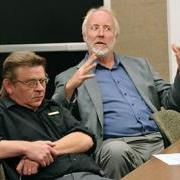|
On SUNY state-operated campuses across the state, UUP Ad Hoc Advisory Committee members have come up with a variety of ways to gather member input on terms and conditions of employment. The Ad Hoc Advisory Committee – which consists of one professional and one academic from every UUP chapter—was charged with compiling and presenting the concerns of the membership at their chapters for consideration as potential UUP proposals. Members of the Ad Hoc Advisory Committee will share the fruits of their labor when they present their reports to the Negotiations Committee and Negotiations Team. The one-day meeting was scheduled for early December as The Voice went to press. “UUP is grateful for the hard work and dedication of our Ad Hoc Advisory Committee members, who have done everything in their power to engage members in conversations about the contract,” said UUP President Phil Smith. “Our members should feel confident that their voices have been heard.” The current UUP contract expires July 1, 2011. BY ALL MEANS From the smallest campuses to the larger health science centers, Ad Hoc Advisory Committee members worked diligently to encourage their colleagues to share ideas, anecdotes and concerns regarding salary, benefits and other terms and conditions of employment. At Farmingdale, Ad Hoc Advisory Committee member Solomon Ayo noted that his chapter used “three different fronts” to gather information and to encourage UUPers to fill out the online survey and member suggestion form. Advisory committee members scheduled special department rep meetings; asked for comments during general membership and Executive Board meetings; and had face-to-face meetings with as many members as possible. UUP Executive Board member Bob Reganse is the chapter’s other advisory committee member. “The department representatives were very enthusiastic and helpful in bringing several members’ concerns to the Ad Hoc Advisory Committee’s attention,” Ayo said. “We have received much input.” At Stony Brook HSC, advisory committee members Carol Gizzi and Bruce Zitkus sent out electronic questionnaires using Survey Monkey; more than 50 percent of those surveyed responded. “The issues of our 3,600 members at the hospital and HSC are not the same as on most campuses,” Gizzi said. “Our members are caregivers and educators who work in the hospital, in clinics, at nursing homes, in the classroom. In many cases, our members have issues that are unknown to staff working at other campuses. It is important that someone bring these issues to the Negotiations Team.” Ad Hoc Advisory Committee members at Binghamton held two focus group discussions, during which the UUPers were urged to comment on what they’d like to see included in the successor agreement. At Buffalo HSC, advisory committee members used the chapter newsletter, bulletin boards and e-mail discussion list to alert UUPers to the online member suggestion form and survey. Advisory committee members at each chapter will prepare an extensive written report on the major issues of their respective memberships. In January, the Negotiations Team and Committee will review all of the data collected through Ad Hoc Advisory Committee reports, the statewide survey, online member suggestion forms, Team visits to every UUP chapter, and the open hearing during the Fall Delegate Assembly. — Karen L. Mattison |
Warning: count(): Parameter must be an array or an object that implements Countable in /home/uuphos5/public_html/voicearchive/wp-includes/class-wp-comment-query.php on line 405


